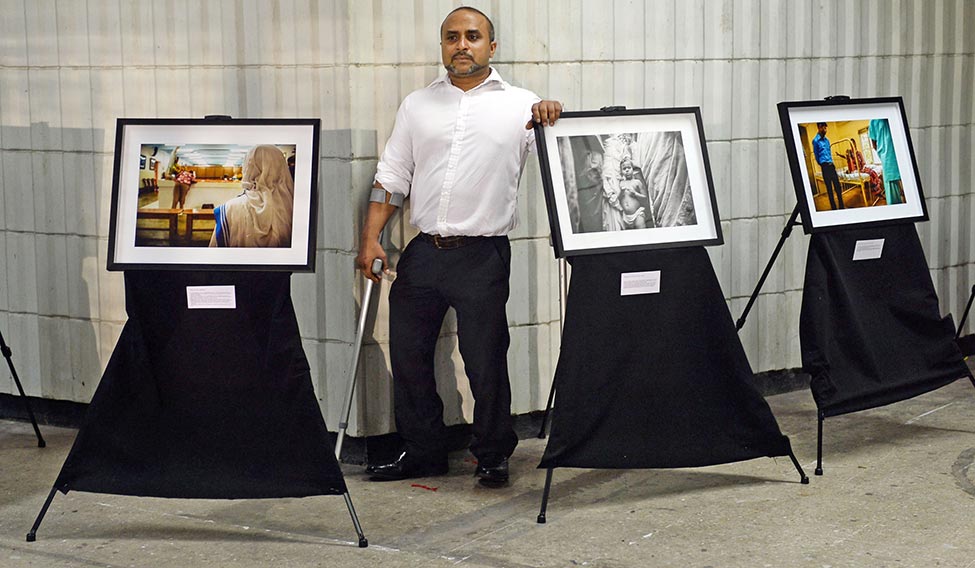One of his earliest memories is about flying kites and watching them dance in Kolkata's summer sky. And, then there were those vapour trails, left by jet engines. He, too, wanted to fly. But, Gautam Lewis could barely walk.
He had contracted polio at 18 months and his biological parents had abandoned him when he was three. He does not remember too much about how he came to live at the Sishu Bhavan run by the Missionaries of Charity. He was told that Mother Teresa had found him on the streets. “I could never recall who my parents were,” the 39-year-old told THE WEEK. “I could have died, as one of five polio-affected children used to die then.”
He underwent two years of surgery at the Rehabilitation Centre for Children, a Kolkata-based NGO that works with underprivileged children who have orthopaedic deformity. And, there he met his mother. Patricia H. Lewis, a doctoral student then, was volunteering at the centre. She adopted him, though he was in no mood to leave Kolkata.
“I did not want to leave Sishu Bhavan, where I had a lot of friends,” he said. “When my new mother took me out of the orphanage, I was crying and pleading with her not to take me away. I cried in the bus, all the way to the airport. I stopped only when I saw the planes on the runway.”
Patricia did not take the seven-year-old directly to cosmopolitan London. Mother and son flew to Auckland, New Zealand, where they stayed for one and a half years. Gautam once told the BBC that if he were not to live in the UK, he would live in New Zealand. “It will always have a special place in my heart, because it was like being in paradise,” he said. The sea in New Zealand, Gautam told THE WEEK, reminded him of Kolkata and the family he had left behind.
Once in the UK, Gautam attended some of the best schools in the country—Hill House School in London counts Prince Charles among its alumni, and Bedales School in Hampshire is alma mater to the likes of Sir Daniel Day-Lewis, the triple Oscar-winning actor. While doing a BA in international business studies at the Southampton Solent University, Gautam opened Level One, a “fashionable nightclub”. He loved the music side of business, and it would become a lifelong love.
He has no qualms in crediting it all to Patricia, who is now research director (international security) at Chatham House, the renowned think-tank. And, what he has for critics of Mother Teresa is a scathing broadside. THE WEEK asked him about criticism that Mother Teresa was strict and dictatorial. Missionaries of Charity does not permit members to watch movies or other entertainment, and nuns sometimes get to meet their families once in five years.
“All restrictions are for them who serve the poor in the organisation,” Gautam said. “Restrictions are not for those who were rescued by the organisation. They are free and could live a life as I am doing. I can smoke, find happiness and roam the world. And, I am even looking for a wife. I wouldn't mind in the least if it were a beautiful, sari-clad Kolkata girl!” He was never under pressure to become a missionary, he said. “I feel hurt when I listen to her critics,” he said. “She did not hurt anybody. She did not cause any harm to anyone. Then, why all these words against her?”
And, what did he think about the charge that the Vatican canonised her based on “unscientific miracles”? Gautam asked: “Show me one religion based on science! Throughout history, India’s unique selling point has been spiritualism. Is spiritualism based on science? Those who oppose her should realise this. It’s same as you loving football, but not a football team. The only scientific thing is that we all came from stars. Big Bang!” He turned down the Vatican's invitation to be present at the canonisation, and chose to be in Kolkata to showcase Mother Teresa's life through a documentary and a photo exhibition.
Gautam has a philosophical take on what Mother Teresa expected of him. He said one mother saved him from death and another armed him for life. “So why should not I enjoy every bit of it [life]?” he asked. “Yes, I may not be perfect. Mother Teresa was not perfect either. But I never forgot the essence of what she said: serve the poor. I am doing that.”
After college, Gautam entered the music business. He was record label manager and artist manager at Ricochet Artist Management, Poptone Records and Creation Management; the last two companies were owned by Scottish businessman Alan McGee. Under McGee, Gautam co-handled bands like Swedish garage rock band The Hives, American indie rock band The Kills and the notorious English rock band The Libertines.
Then, he gave it all up to work with the physically challenged. In 2007, Gautam fulfilled his childhood dream and became a pilot, “passing all his ground and air examinations in just six months”. The same year he founded Freedom In The Air, a non-profit that makes “flying more accessible for young people with disabilities....”
He also became an ambassador for the global polio eradication initiative launched by the UN, with the support of G8 and G20 nations and NGOs. “I came to know about countries where polio vaccination is becoming difficult, including the the city where I contracted polio,” said Gautam. As ambassador, he has travelled extensively in India, Pakistan, Bangladesh and Africa. He never could get security clearance to visit Afghanistan, so Kabul remains an itch.
India, he said, is a grand success story. Muslims who resist vaccination should learn from Saudi Arabia, he said. “A Muslim who is not vaccinated for polio cannot enter Mecca. Then, why should Pakistanis and others object?” he asked.







